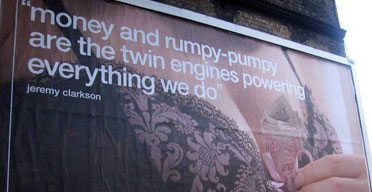
A recent quote was on a UK poster. The quote was from Jeremy Clarkson, the biggest bloke (translates into yob, lout, brute) in Britain, and it said: “money and rumpy-pumpy are the twin engines powering everything we do”.

... in other words, money and sex make the world go around.
Now, there is some truth in this phrase, as I’ve blogged before, and this is why the psychology of money is a critical discipline that banks possibly undervalue or even misunderstand.
Now, there is some truth in this phrase, as I’ve blogged before, and this is why the psychology of money is a critical discipline that banks possibly undervalue or even misunderstand.
There are many reports related to the psychology of money and a number of books about it.
Money is often viewed as being even more sacrosanct than sex for some, in terms of our view of privacy. That is why many people are more willing to talk about their life in the bedroom rather than reveal how much they earn. It is why folks are more likely to divorce their partner than their bank; and it is also why we have our extreme love/hate relationship with our banks, because money is one of the most emotive subjects in our lives.
This all came to mind this morning due to the BBC running around and asking people to tell them how much they earn.
How very dare they?
Yet surprisingly, two thirds of workers say they would happily talk about how much they earn, according to the news item. This flies in the face of many organisational policies, where discussing earnings or asking a co-worker how much they earn is a ‘disciplinary offence’.
Similarly, there was ‘outrage’ in Italy last week, when the government opened a website with the earnings details of every Italian freely available online. No wonder the website was overwhelmed with people wanting to know how much everyone makes, especially neighbours, bosses and co-workers.
So what is going on here?
Well, much is related to our brain and how we see ourselves in the world. The brain puts money very high on our most important views of the world.
No wonder, as money today creates our first means of survival. Food and shelter are no longer our priority, but generating cash, money, that pays for food and shelter. The more money, the more food and shelter you can get.
In fact, after covering Maslow’s basic needs – food and shelter – money allows us to serve our more important needs in today's consumer societies: belonging, self-esteem and self-actualisation. In other words, it is our financial standing that enables our ego and superego to flourish or whither.
The bigger the wallet, the bigger the ego can go on display. Flash the cash, have a bigger car, buy a bigger house, wear a better label, eat at a better restaurant.
So it was interesting to spot a few reports on how the brain thinks about money, with one of the most interesting byNikhil Swaminathan in Scientific American.
A scientific study found that we are more worried about our social standing than we are about money. We want to be seen as superior and place our social standing extremely highly in our psyche. So today, social status is the top of Maslow's hierarchy, and money enables us to feed that status.
Social standing is all about ego and superego, belonging, self-esteem and how we are seen by others. Money can buy lots of things that support our ability to gain higher social standing. It’s not the money that’s important; it’s the position in society that money buys us.
This is why money, and therefore banking, is so critical to our world and why we have this love/hate relationship with our banks. Our banks affect our social standing, our self-esteem, our ego. The harder it is to find a bank that is flexible and appropriate to our needs, the more frustrated and angry we become, and vice versa.
The psychology of money fascinates me, because it is a critical part of understanding customer perspectives in banking. The psychology of money should be a key part of banking and bank product development, but is undervalued as a discipline.
The fact that money can buy anything if we have enough it – food, shelter, belonging, social standing, self-esteem and self-actualisation – is why this is core. And the only thing money still can’t buy is love, I guess.
Chris M Skinner
Chris Skinner is best known as an independent commentator on the financial markets through his blog, TheFinanser.com, as author of the bestselling book Digital Bank, and Chair of the European networking forum the Financial Services Club. He has been voted one of the most influential people in banking by The Financial Brand (as well as one of the best blogs), a FinTech Titan (Next Bank), one of the Fintech Leaders you need to follow (City AM, Deluxe and Jax Finance), as well as one of the Top 40 most influential people in financial technology by the Wall Street Journal's Financial News. To learn more click here...

